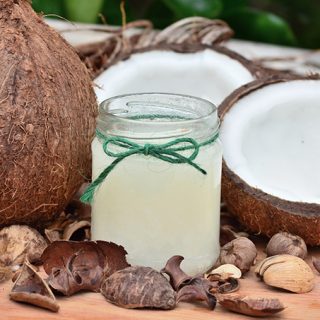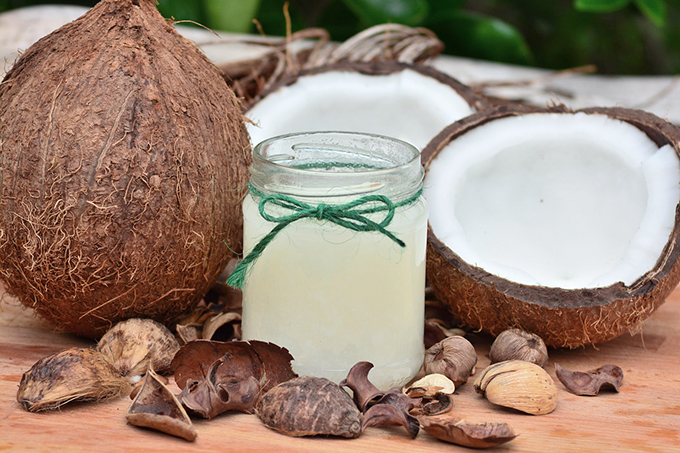
The use of coconut oil and coconut milk has recently increased in popularity in both vegan and non-vegan cuisines, based in part of claims that it was a “different” saturated fat, one that could be consumed without harm to health and, according to some books and articles, it should be consumed to improve health.
I am a physician but not a nutritionist, so I would like to direct your attention to this well-written article from the people at the respected Pritikin Longevity Center. To this very clear overview of what we know about coconut oil and health,https://mainstreetvegan.comwp-admin/media-upload.php?post_id=4972&type=image&TB_iframe=1 I would add my personal story.
When I first went completely vegan, I asked a friend of mine, who always made very yummy food, how he would roast vegetables. He showed me how to carefully cut all the vegetables, including his little “X” cut into bottom of every Brussels sprout so it cooked well. He recommended melting coconut oil in a saucepan and then coating every vegetable in this liquid oil. I was excited about being a new vegan, and I made and consumed pretty large quantities of vegetables at the time. Even as a medical doctor, I really never considered the effect that about a quarter-cup of coconut oil nightly might be having on my health.
I was taken totally by surprise, then, after getting my cholesterol checked: my total cholesterol went up to 220, and my LDL-cholesterol, the most atherogenic and vessel clogging kind, was suddenly higher than ever — 120! I was committed to staying vegan and quickly realized that the oil was the culprit. I was using only coconut oil at that time and rarely used any other high-fat product. In my case, I simply stopped tossing my vegetables in coconut oil. Someone else might get blood test results like these and, unfortunately, abandon veganism entirely, blaming those numbers on a lack of fish or egg whites or low-fat dairy.
I took the three-month Rouxbe cooking course and learned to cook without any oil. The only change I made in my diet was to roast my vegetables without coconut oil. I rechecked my cholesterol after a few months, and now my total cholesterol was 143 and my LDL’s were down to 60: that’s 120 to 60, with no other change than stopping my frequent use of coconut oil.
 I think it is important to realize that coconut oil is mostly saturated fat, and saturated fat raises LDL cholesterol levels. I would welcome hearing other stories involving the use of coconut oil and its effects on blood cholesterol levels. Personally, the science and my own experience are enough to convince me to stay away from this and all saturated fat as much as possible, and not make coconut oil a regular part of my plant-based diet.
I think it is important to realize that coconut oil is mostly saturated fat, and saturated fat raises LDL cholesterol levels. I would welcome hearing other stories involving the use of coconut oil and its effects on blood cholesterol levels. Personally, the science and my own experience are enough to convince me to stay away from this and all saturated fat as much as possible, and not make coconut oil a regular part of my plant-based diet.
Debra Shapiro, MD, FACOG, is an OB/Gyn living in the Bay Area of California. She attended Main Street Vegan Academy in July of 2017. Follow her on Instagram @A_New_View_Of_Food.


Such helpful simple science. Thanks, Debra!
You are so welcome!
Have recently heard that not all ldl cholesterol is bad, some is actually very good for us !
Good question. All LDL is atherogenic meaning that it causes cardiovascular disease. There are small dense particles as well as larger fluffier particles. The latter are less dangerous to your blood vessels, but still not helpful, the way HDL cholesterol is. The bottom line on cholesterol is that we make all the cholesterol we need for cell membranes and manufacture of hormones; we do not have any need to ingest cholesterol from animal products. I recommend you check out Michael Greger’s site, NutritionFacts.org to learn more about cholesterol and LDL-C specifically. The electron micrograph showing LDL crystals puncturing the atherosclerotic plaque is very impactful. Take care!
Thank you for your information!
Thank you for sharing. I’m only a week in and I’m loving it. However, I had been curious as to why it was recommended not to use coconut or olive oil.
Great information!!!
Victoria Moran here, director of Main Street Vegan. I’m not the author of the article, but there are many in the plant-based health world who do not recommend the use of oils based on concerns about heart health. You can read more about that in the work of Caldwell Esselstyn, Jr., MD, and John McDougall, MD. I personally will use a little olive oil, but I avoid coconut oil and coconut in general because, as Dr. Shapiro notes in her post, its very high saturated fat content raises LDL cholesterol, and that is not something I want to do. On the other hand, coconuts are from the plant kingdom and they are, therefore, vegan. It is not our job here at Main Street Vegan to tell any vegan what to eat and what not to eat, but merely to share information. Take what you like and leave the rest. Thanks for reading and commenting.
Thank you Deborah.
I started using MCT oil daily to improve my focus and brain fog. It has helped a lot. I am a bit concerned about the cholesterol levels, but I also have to wonder if cholesterol levels in someone eating a healthy plant based diet have as much meaning as they do in someone who eats meats and processed foods. I had a CT of my heart recently that showed a heart healthier than someone half my age and completely clear arteries.
I would certainly welcome any insight on this. Thank you for your article.
I’m glad that you are feeling better using MCT oil, however there really isn’t any good science to recommend those supplements. You can learn more about Medium Chain Fatty Acids on Dr. Greger’s site: NutritionFacts.org. Folks have talked about the healthfulness of coconut oil being due to the MCT’s but the main fatty acid in coconut oil is Lauric acid and it is quite atherogenic, raising LDL cholesterol. Dr. Greger does recommend taking 250 mg of algae-sourced Omega 3’s for brain health, 2000 mg of vitamin D a day and 2500 mcg of Vit B12 per week, but there is no reason to take MCT oil that I could find. Of course, research is always ongoing, so sign up to get updates from NutritionFacts.org and you can post your questions there, as well. Regarding your question of having a cholesterol over 150 when you already eat a WFPB no oil diet, I agree your risk of cardiovascular disease is probably very low. I am not a cardiologist, though.